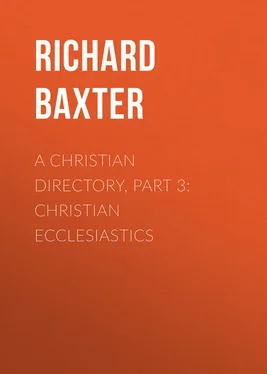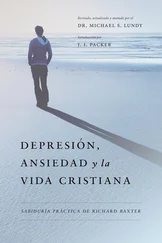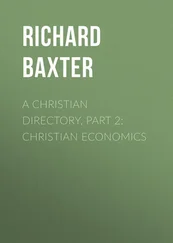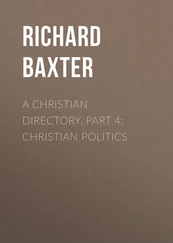Richard Baxter - A Christian Directory, Part 3 - Christian Ecclesiastics
Здесь есть возможность читать онлайн «Richard Baxter - A Christian Directory, Part 3 - Christian Ecclesiastics» — ознакомительный отрывок электронной книги совершенно бесплатно, а после прочтения отрывка купить полную версию. В некоторых случаях можно слушать аудио, скачать через торрент в формате fb2 и присутствует краткое содержание. Жанр: foreign_antique, foreign_prose, на английском языке. Описание произведения, (предисловие) а так же отзывы посетителей доступны на портале библиотеки ЛибКат.
- Название:A Christian Directory, Part 3: Christian Ecclesiastics
- Автор:
- Жанр:
- Год:неизвестен
- ISBN:нет данных
- Рейтинг книги:3 / 5. Голосов: 1
-
Избранное:Добавить в избранное
- Отзывы:
-
Ваша оценка:
- 60
- 1
- 2
- 3
- 4
- 5
A Christian Directory, Part 3: Christian Ecclesiastics: краткое содержание, описание и аннотация
Предлагаем к чтению аннотацию, описание, краткое содержание или предисловие (зависит от того, что написал сам автор книги «A Christian Directory, Part 3: Christian Ecclesiastics»). Если вы не нашли необходимую информацию о книге — напишите в комментариях, мы постараемся отыскать её.
A Christian Directory, Part 3: Christian Ecclesiastics — читать онлайн ознакомительный отрывок
Ниже представлен текст книги, разбитый по страницам. Система сохранения места последней прочитанной страницы, позволяет с удобством читать онлайн бесплатно книгу «A Christian Directory, Part 3: Christian Ecclesiastics», без необходимости каждый раз заново искать на чём Вы остановились. Поставьте закладку, и сможете в любой момент перейти на страницу, на которой закончили чтение.
Интервал:
Закладка:
Rule XIV. If any power should impose an oath, or vow, or promise, which in the proper, usual sense were downright impious, or blasphemous, or sinful, and yet bid me take it in what sense I pleased, though I could take it in such a sense as might make it no real consent to the impiety, yet it would be impious in the sense of the world, and of such heinous consequence as will make it to be unlawful. As if I must subscribe, or say, or swear these words, There is no God; or, Scripture is untrue; though it is easy to use these or any words in a good sense, if I may put what sense I will upon them, yet the public sense of them is blasphemy; and I may not publicly blaspheme, on pretence of a private right sense and intention.
Rule XV. If the oath imposed be true in the strict and proper sense, yet if that sense be not vulgarly known, nor sufficiently manifest to be the imposer's sense, and if the words are false or blasphemous in the vulgar sense of those that I have to do with, and that must observe and make use of my example, I must not take such an oath, without leave to make my sense as public as my oath. As if I were commanded to swear, That God hath no foreknowledge, no knowledge, no will, &c.; it were easy to prove that these terms are spoken primarily of man, and that they are attributed to God but analogically or metaphorically, and that God hath no such human acts formaliter , but eminenter , and that forma dat nomen , and so that strictly it is not knowledge and will in the primary, proper notion, that God hath at all, but something infinitely higher, for which man hath no other name. But though thus the words are true and justifiable in the strictest, proper sense, yet are they unlawful, because they are blasphemy in the vulgar sense: and he that speaks to the vulgar is supposed to speak with the vulgar; unless he as publicly explain them.
Rule XVI. If the supreme power should impose an oath or promise, which in the ordinary, obvious sense were sinful, and an inferior officer would bid me take it in what sense I pleased, I might not therefore take it: because that such an officer hath no power to interpret it himself; much less to allow me to take it in a private sense. But if the lawgiver that imposeth it bid me take it in what sense I will, and give me leave to make my sense as public as my oath, I may take it, if the words be but dubious, and not apparently false or sinful: (so there be no reason against it, aliunde , as from ill consequents, &c.)
Rule XVII. If any man will say in such a case, (when he thinketh that the imposer's sense is bad,) I take not the same oath or engagement which is imposed, but another in the same words, and I suppose not inferior officers authorized to admit any interpretation, but I look at them only as men that can actually execute or not execute the laws upon me; and so I take a vow of my own according to my own sense, though in their words, as a means of my avoiding their severities: as this is a collusion in a very high and tender business, so that person (if the public sense of the oath be sinful) must make his professed sense as public as his oath or promise; it being no small thing to do that which in the public sense is impious, and so to be an example of perfidiousness to many.
Rule XVIII. Though an oath imposed by a usurper or by violence is not to be taken in formal obedience, nor at all, unless the greatness of the benefit require it, yet being taken it is nevertheless obligatory 73 73 Sanders. p. 122-133.
(supposing nothing else do make it void). Man is a free agent, and cannot be forced, though he may be frightened: if he swear to a thief for the saving of his life, he voluntarily doth choose the inconveniences of the oath, as a means to save his life. Therefore being a voluntary act it is obligatory; else there should be no obligation on us to suffer for Christ, but any thing might be sworn or done to escape suffering: see of this Dr. Sanderson largely, Prælect. iv. sect. 14-16. The imposition and the oath are different things: in the imposition, a thief or tyrant is the party commanding, and I am the party commanded; and his having no authority to command me, doth nullify only his command, and maketh me not obliged to obey him, nor to take it in any obedience to him; but yet if I do take it without any authority obliging me, (as private oaths are taken,) it is still an oath or vow, in which the parties are God and man; man vowing and making himself a debtor to God; and God hath authority to require me to keep my vows, when men have no authority to require me to make them. All men confess that private vows bind; and the nullity of the imposer's authority, maketh them but private vows. This case is easy, and commonly agreed on.
Rule XIX. If in a complex vow or promise there be many things which prove materially unlawful, and one or more that are lawful, the conjunction of the things unlawful doth not disoblige me from the vow of doing the lawful part. Otherwise a man might make void all his vows to God, and oaths and covenants with men, by putting in something that is evil with the good; and so God, and the king, and our neighbours would have their debts paid by our sin and injury done them on the bye.
Rule XX. If some part of that which you vowed become impossible, that doth not disoblige you from so much as remaineth possible. As if you vow allegiance to the king, and tyrants or disability hinder you from serving him as subjects in some one particular way, you remain still obliged to serve him by those other ways in which you are yet capable to serve him. So if you had taken an oath against popery, to preach against it, and reject the practice of it, and for ever renounce it; this would not bind you from the common truths and duties of christianity, which papists hold in common with all other christians: nor could you preach against popery, if you were hindered by imprisonment, banishment, or restraint; but you have still power to forbear approving, consenting, subscribing, or practising their errors; and this you are still bound to do.
Rule XXI. Though you are not bound to do that of your vow which changes have made impossible or unlawful, yet if another change make them possible and lawful again, your obligation doth return afresh (unless you made it with such limitation). It is not a temporary cessation of the matter, or end, or correlate, that will perpetually discharge you from your vow. If your wife be taken captive many years, when she returneth, you are bound to the duties of a husband. If the king be expelled by usurpers, you are bound at present to so much duty as is possible, and to obey him as your actual governor when he returneth. But in the case of servants and soldiers, and other temporary relations, it is otherwise; for a removal may end the relation itself. If you promise to preach the gospel, to medicate the sick, to relieve the poor, to reform your families, &c. you are not hereby obliged to do it while any unresistible impediment maketh it impossible; but when the hinderance ceaseth, you are obliged to do it again; the matter and your capacity being restored.
Rule XXII. Therefore many a vow and promise may be lawfully unperformed, which may not be renounced or disclaimed. When you are taken captives you must forbear your duty to your king, your father, your husband or wife, but you may not therefore renounce them, and say, I have no obligation to them: no, not to the death; because they are relations for life; and how improbable soever it may seem that you should be returned to them, yet God can do it, and you must wait on him.
Rule XXIII. A former vow or promise is not nullified by a latter that contradicteth it. 74 74 Sanders. p. 50.
Otherwise a man might disoblige himself at his pleasure. Yet he that maketh contrary vows, obligeth himself to contraries and impossibles; and bringeth a necessity of perjury on himself, for not doing the things impossible which he vowed. And in some cases a later promise to men may null a former, when we made the former with the reserve of such a power or liberty, or are justly supposed to have power, to recall a former promise: or when it is the duty of a mutable relation which we vow, (as of a physician, a schoolmaster, &c.) and by a later vow we change the relation itself (which we may still lawfully change).
Интервал:
Закладка:
Похожие книги на «A Christian Directory, Part 3: Christian Ecclesiastics»
Представляем Вашему вниманию похожие книги на «A Christian Directory, Part 3: Christian Ecclesiastics» списком для выбора. Мы отобрали схожую по названию и смыслу литературу в надежде предоставить читателям больше вариантов отыскать новые, интересные, ещё непрочитанные произведения.
Обсуждение, отзывы о книге «A Christian Directory, Part 3: Christian Ecclesiastics» и просто собственные мнения читателей. Оставьте ваши комментарии, напишите, что Вы думаете о произведении, его смысле или главных героях. Укажите что конкретно понравилось, а что нет, и почему Вы так считаете.












